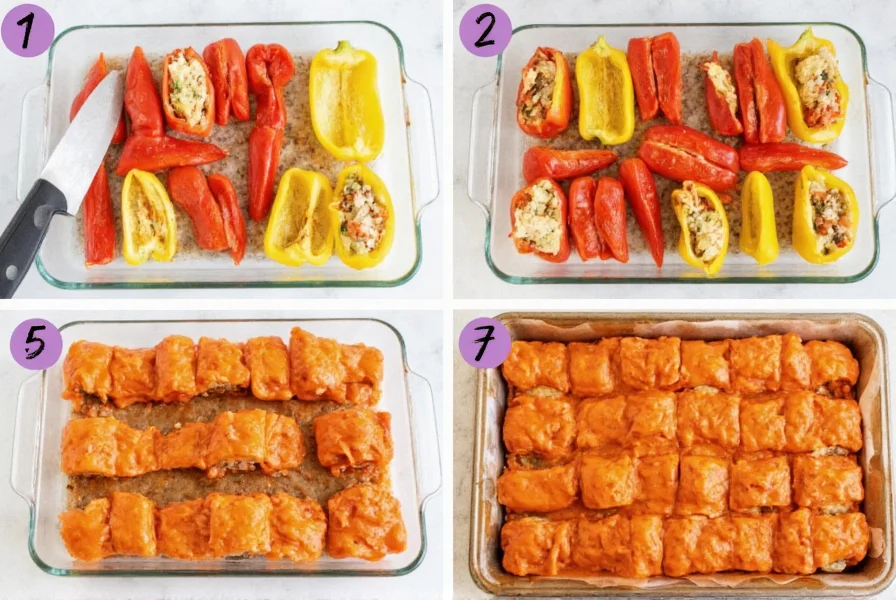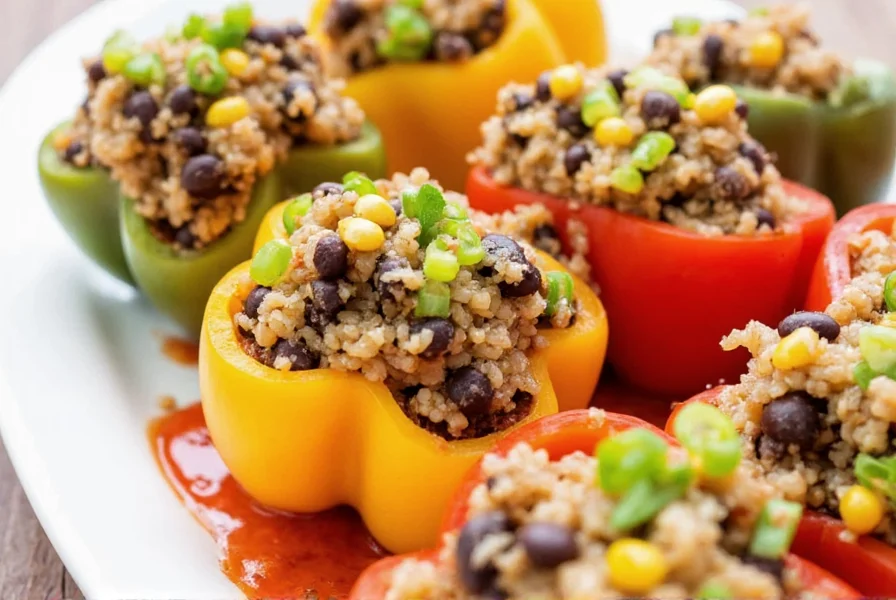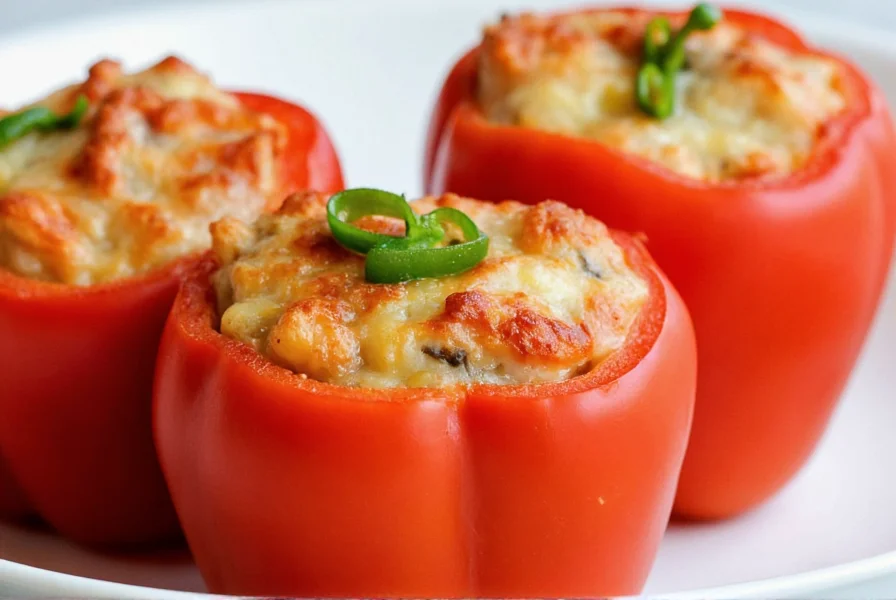Creating perfect stuffed peppers requires understanding the right balance of ingredients and cooking techniques. Whether you're preparing a classic meat-and-rice version or exploring modern variations, the key lies in proper pepper preparation, filling consistency, and baking methodology. This guide provides professional-tested approaches to ensure your stuffed peppers turn out flavorful and structurally sound every time.
Essential Ingredients for Perfect Stuffed Peppers
The foundation of any successful stuffed pepper recipe involves quality ingredients and proper ratios. Bell peppers serve as both container and flavor component, so selecting the right variety matters. Green peppers offer a slightly bitter note that balances rich fillings, while red, yellow, and orange varieties add natural sweetness. For authentic ground beef stuffed pepper recipes, use 80/20 ground beef for optimal moisture and flavor.
When preparing easy stuffed bell pepper recipes, consider these ingredient ratios for consistent results:
| Pepper Size | Ground Meat | Cooked Rice | Tomato Sauce | Servings |
|---|---|---|---|---|
| Medium (4-5") | 1/2 lb | 1/4 cup | 2 tbsp | 1 |
| Large (5-6") | 3/4 lb | 1/3 cup | 3 tbsp | 1 |
| Extra Large (6+") | 1 lb | 1/2 cup | 1/4 cup | 2 |
Step-by-Step Preparation Guide
Achieving restaurant-quality stuffed peppers at home requires attention to specific techniques. First, select firm peppers with flat bottoms that stand upright. Cut tops horizontally, removing seeds and membranes while preserving the structural integrity of the pepper walls. Blanching peppers for 3-4 minutes in boiling water softens them slightly without compromising their ability to hold shape during baking—a crucial step for how to make stuffed peppers not soggy.
For the filling, sauté onions and garlic before adding ground meat to develop flavor depth. Cook meat thoroughly, then mix with cooked rice, diced tomatoes, and seasonings. The filling should be moist but not wet—excess liquid causes sogginess. When assembling, pack filling firmly but don't overstuff, leaving 1/2 inch space at the top for expansion during baking.

5 Flavorful Stuffed Pepper Variations
Expand your culinary repertoire with these tested variations that cater to different dietary preferences while maintaining structural integrity and flavor balance.
1. Classic Beef and Rice Stuffed Peppers
The traditional traditional stuffed pepper recipe combines ground beef, long-grain rice, tomato sauce, and cheese. For enhanced flavor, add Worcestershire sauce and smoked paprika to the meat mixture. Bake at 375°F for 35-40 minutes until peppers are tender-crisp. Top with fresh parsley and additional cheese during the last 5 minutes of baked stuffed peppers cooking time.
2. Vegetarian Quinoa Stuffed Peppers
For vegetarian stuffed pepper recipes, substitute meat with cooked quinoa, black beans, corn, and diced zucchini. Use vegetable broth instead of meat drippings for moisture. Add cumin and chili powder for depth. This protein-rich alternative maintains texture better than rice-based vegetarian versions and works well for meal prep stuffed pepper recipes as it reheats beautifully.

3. Mediterranean Stuffed Peppers
Combine ground lamb with bulgur wheat, pine nuts, currants, and a blend of oregano and mint. Top with crumbled feta before baking. This variation offers a sophisticated flavor profile while maintaining the structural requirements of proper stuffed pepper recipes.
4. Low-Carb Sausage and Cauliflower Rice
For low carb stuffed pepper alternatives, replace traditional rice with riced cauliflower sautéed until moisture evaporates. Use Italian sausage for robust flavor and add sun-dried tomatoes for concentrated umami. Bake at 375°F for 25-30 minutes—slightly less than traditional versions since cauliflower rice requires less cooking time.
5. Cheesy Mexican Stuffed Peppers
Combine ground beef with taco seasoning, black beans, corn, and diced tomatoes with green chilies. Layer with pepper jack cheese and top with avocado crema after baking. This crowd-pleasing version works exceptionally well for meal prep as flavors meld beautifully when stored properly.
Avoiding Common Stuffed Pepper Mistakes
Even experienced cooks encounter issues with stuffed peppers. The most frequent problem—sogginess—typically results from improper pepper preparation or overly moist filling. To prevent this, always salt cut pepper halves and let them drain upside down for 10 minutes before filling. For healthy stuffed pepper recipes that maintain structure, reduce added liquids and rely on natural moisture from ingredients.
Another common issue is uneven cooking, where the filling cooks faster than the peppers. Solution: par-cook peppers slightly before stuffing, or cover with foil during the first half of baking time to steam the peppers gently before finishing uncovered to set the filling.
Storage and Reheating Guidelines
Properly stored stuffed peppers maintain quality for 3-4 days in the refrigerator or up to 3 months frozen. When reheating meal prep stuffed pepper recipes, add a splash of broth or water to restore moisture. Microwave reheating works but often makes peppers rubbery—oven reheating at 325°F covered with foil preserves texture better.
Nutritional Considerations
Stuffed peppers naturally incorporate vegetables, making them nutritionally balanced when properly formulated. A standard beef and rice version provides approximately 350-450 calories per serving with 20-25g protein. For lighter versions, increase vegetable content while reducing meat proportionally. The bell pepper itself contributes significant vitamin C and fiber, enhancing the nutritional profile of any healthy stuffed pepper recipes.
Frequently Asked Questions
How do you prevent stuffed peppers from becoming soggy?
Prevent sogginess by salting cut pepper halves and draining them upside down for 10 minutes before filling. Use a filling with proper moisture balance—cook rice thoroughly and drain excess fat from meat. Par-cook peppers slightly before stuffing, and avoid overfilling to prevent liquid leakage during baking.
What's the ideal baking temperature and time for stuffed peppers?
Bake stuffed peppers at 375°F for 35-40 minutes for standard recipes. Larger peppers may require up to 45 minutes. The peppers should be tender but still hold their shape, and the filling should reach 165°F internally. Cover with foil for the first 20 minutes to steam the peppers, then finish uncovered to set the filling.
Can stuffed peppers be prepared ahead of time?
Yes, stuffed peppers make excellent meal prep. Assemble completely, cover tightly, and refrigerate for up to 24 hours before baking. For longer storage, freeze unbaked stuffed peppers on a baking sheet, then transfer to freezer bags. Bake frozen peppers at 375°F for 55-60 minutes, adding 15-20 minutes to the standard baking time.
What are good rice alternatives for stuffed peppers?
Excellent rice alternatives include quinoa, cauliflower rice, couscous, orzo, or even diced mushrooms for low-carb options. When using cauliflower rice, sauté it thoroughly to remove excess moisture. Quinoa provides complete protein and holds structure well, making it ideal for vegetarian stuffed pepper recipes.
How can I make stuffed peppers vegetarian without sacrificing texture?
For vegetarian stuffed peppers with proper texture, combine cooked quinoa or bulgur with black beans, lentils, or textured vegetable protein. Add diced zucchini, mushrooms, or eggplant that have been pre-cooked to remove excess moisture. Use tomato paste instead of liquid tomatoes to maintain filling consistency while providing flavor depth.











 浙公网安备
33010002000092号
浙公网安备
33010002000092号 浙B2-20120091-4
浙B2-20120091-4